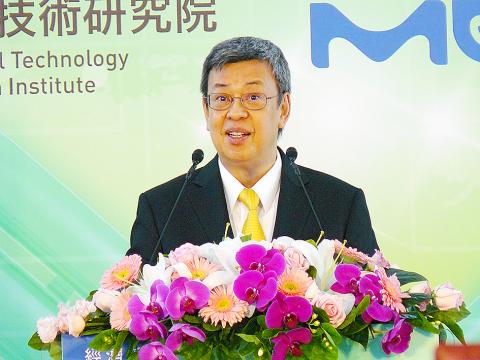The government has set sights on biotechnology as the nation’s next NT$1 trillion (US$33.6 billion) industry, Vice President Chen Chien-jen (陳建仁) said yesterday.
Biotechnology is part of the government’s efforts in industrial innovation, which is at the top of President Tsai Ying-wen’s (蔡英文) agenda for industrial restructuring to boost global competitiveness.
The “five plus two” industries refer to the government’s seven development projects aimed at transforming the nation’s economic and industrial structures, including projects related to the “Asian Silicon Valley” development plan, as well as the biotech, green energy, aviation, smart machinery and defense industries.

Photo: CNA
The production value of the local biotech industry stood at NT$315 billion in 2016, up from NT$298.6 billion in 2015, according to the Ministry of Economic Affairs.
Cultivating personnel in precision medicine, one of the fastest growing segment in the biomedicine in the past few years, would be crucial to the endeavor, Chen said in a speech at the inauguration of a research and development (R&D) and training collaboration program between the government’s Industrial Technology Research Institute (ITRI, 工研院) and Germany-based pharmaceutical and life science giant Merck KGaA.
ITRI and Merck in March signed a memorandum of understanding for program to set up an innovation campus at the institute’s Guangfu campus in Hsinchu.
The partnership, which is to continue for 18 months, is aimed at cultivating 120 high-end biotech professionals in one year.
Merck is to introduce manufacturing technologies for antibody-drug conjugates, helping Taiwanese companies prepare to meet stringent requirements and enter advanced international pharmaceutical markets.
Across the globe, major precision medicine initiatives have been launched, such as the UK’s 100,000 Genomes Project in 2014 to improve diagnostic technology through genome sequencing, and the US’ 21st Century Cures Act in 2016 to allow faster approval process to encourage innovation-oriented research in pharmaceuticals and medical devices, Chen said.
The ITRI’s Industrial Economics and Knowledge Center estimated the global precision medicine market at US$38.9 billion in 2015, with the market projected to see continued compound annual growth rate of 12.3 percent and reach US$69.5 billion in 2020.
Meanwhile, the TPEX’s Bio Index, which has become a hub for local biotechnology firms, has rallied from about 133 points at the beginning of this year to close at 156.07 points yesterday in Taipei trading.
Recent highlights for Taiwan’s biotech industry include TaiMed Biologics Inc (中裕新藥), whose HIV/AIDS treatment, Trogarzo, has begun sales in the US, while a number of health insurance carriers are anticipated to begin covering treatments, the company said last month.

AIR SUPPORT: The Ministry of National Defense thanked the US for the delivery, adding that it was an indicator of the White House’s commitment to the Taiwan Relations Act Deputy Minister of National Defense Po Horng-huei (柏鴻輝) and Representative to the US Alexander Yui on Friday attended a delivery ceremony for the first of Taiwan’s long-awaited 66 F-16C/D Block 70 jets at a Lockheed Martin Corp factory in Greenville, South Carolina. “We are so proud to be the global home of the F-16 and to support Taiwan’s air defense capabilities,” US Representative William Timmons wrote on X, alongside a photograph of Taiwanese and US officials at the event. The F-16C/D Block 70 jets Taiwan ordered have the same capabilities as aircraft that had been upgraded to F-16Vs. The batch of Lockheed Martin

GRIDLOCK: The National Fire Agency’s Special Search and Rescue team is on standby to travel to the countries to help out with the rescue effort A powerful earthquake rocked Myanmar and neighboring Thailand yesterday, killing at least three people in Bangkok and burying dozens when a high-rise building under construction collapsed. Footage shared on social media from Myanmar’s second-largest city showed widespread destruction, raising fears that many were trapped under the rubble or killed. The magnitude 7.7 earthquake, with an epicenter near Mandalay in Myanmar, struck at midday and was followed by a strong magnitude 6.4 aftershock. The extent of death, injury and destruction — especially in Myanmar, which is embroiled in a civil war and where information is tightly controlled at the best of times —

Taiwan was ranked the fourth-safest country in the world with a score of 82.9, trailing only Andorra, the United Arab Emirates and Qatar in Numbeo’s Safety Index by Country report. Taiwan’s score improved by 0.1 points compared with last year’s mid-year report, which had Taiwan fourth with a score of 82.8. However, both scores were lower than in last year’s first review, when Taiwan scored 83.3, and are a long way from when Taiwan was named the second-safest country in the world in 2021, scoring 84.8. Taiwan ranked higher than Singapore in ninth with a score of 77.4 and Japan in 10th with

China's military today said it began joint army, navy and rocket force exercises around Taiwan to "serve as a stern warning and powerful deterrent against Taiwanese independence," calling President William Lai (賴清德) a "parasite." The exercises come after Lai called Beijing a "foreign hostile force" last month. More than 10 Chinese military ships approached close to Taiwan's 24 nautical mile (44.4km) contiguous zone this morning and Taiwan sent its own warships to respond, two senior Taiwanese officials said. Taiwan has not yet detected any live fire by the Chinese military so far, one of the officials said. The drills took place after US Secretary